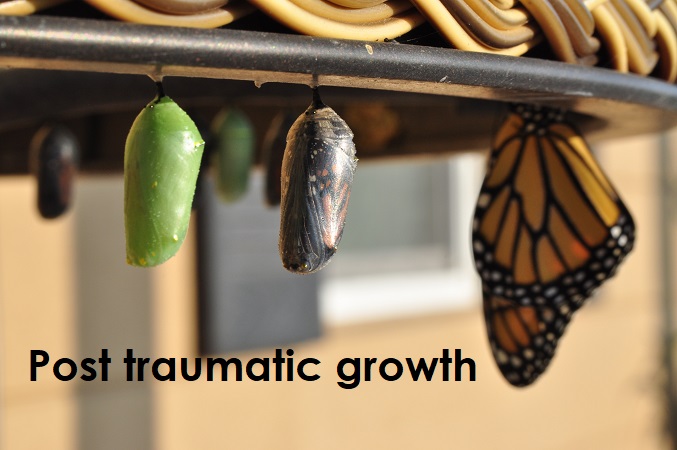Post Traumatic Growth
Post Traumatic Growth (PTG) is the positive change that can happen in the wake of a traumatic event – the positive psychological change that comes as a result of the struggle with highly challenging life circumstances. This idea fits well with the work that many OTs are involved in – doesn’t it. We work with people who have their occupational lives challenged by many situations disability, injury, disease as well as isolation, marginalisation and displacement (and we could add to that list, couldn’t we!)
Miriam Akhtar notes in her little gem of a book “#whatis Post Traumatic Growth”, that there are three main areas of life in which people experience change:
– Change in the self e.g. rising to the challenge, growing in strength etc
– Change in relationships e.g. experiencing a greater need for connection, valuing friends etc
– Change in life philosophy. Our worldview shifts and our perception changes
Post Traumatic Growth is thought to involve a dismantling and rebuilding of our internal world and much of the early thinking is based on the “Shattered Assumptions” theory (1992) of Prof Ronnie Janoff-Bulman. Rebuilding our internal world inevitably involves a form of cognitive restructuring and major shifts in the way we view the world.
It’s in this ongoing cognitive restructuring and adapting to our change in world view that I feel coaching plays a massive role. Whilst as OTs we might not be able to work with someone long enough to see them through to Post Traumatic Growth, we can help in the following ways:
– coping positively while in the eye of the storm
– strengthening resilience for times of extreme stress
– lay the foundations for future growth (Akhtar 2017)
I think as OTs we always aim to use occupation to help us cope positively, build resilience etc but coaching conversations can help greatly too. Coaching can help us learn and process whats going on, by providing time for reflection, analysis and simply by being listened to. Coaching can help highlight the need for greater self compassion during these times and help us recognise our often unhelpful patterns and ways of dealing with things. Coaching helps us to unpick situations and reframe them – one of the cornerstones of building resilience Coaching can help people learn to understand and accept their emerging new world view. All of this helps people to lay the foundations for future growth, by fostering our internal coach.
My desire for OTs is that coaching becomes intrinsic to their practice. This can happen naturally as coaching conversations could occur naturally during treatment sessions, or as as distinct tool that we use more strategically. It’s a powerful way to help people adapt, learn and move forward and whilst some Post Traumatic Growth clearly occurs naturally, imagine what could happen in the world if people had more support. Click here to start using coaching in OT |

